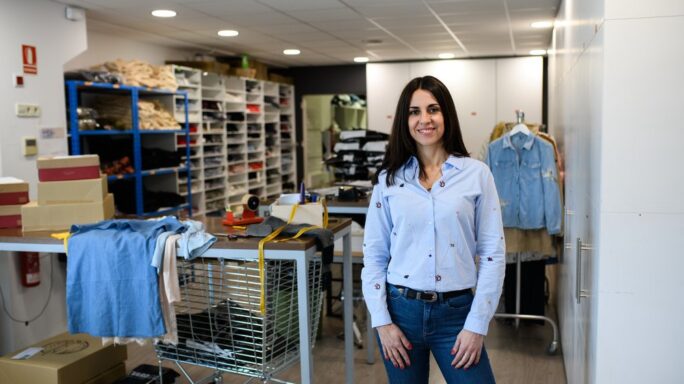Strategy, Legal & Operations
Strong Roots: How to manage inventory and the supply chain
Samuel Dennigan is the founder of Strong Roots, a business in the food and beverage industry. There's a need to manage inventory.

Want to effectively manage inventory and the supply chain for your business? It can be tricky to get the right balance. In this interview, which is a part of a series in partnership with content creators the Startup Van, the founder of frozen food company Strong Roots shares his experiences and advice on inventory and supply chains.
Samuel Dennigan is the founder of Strong Roots, a business in the food and drink industry, which has quickly made waves with a product that combines frozen-food convenience, innovation and a more recent trend of healthy, adventurous eating.
Strong Roots specialises in producing healthy and innovative frozen food products that makes use of quality natural ingredients, which Samuel feels other frozen-food suppliers are not catering for.
Having spent a decade in his family’s vegetable business in Dublin, he was well positioned to meet the challenges of setting up a food and drink business due to his understanding of every level of the supply chain, with experience of working with suppliers, retailers and consumers.
In 2015, Samuel established Strong Roots, targeting a gap in the market for premium-quality frozen food with a message that frozen can be just as good, and even superior, to fresh produce.
Strong Roots was quickly accepted into an Irish food accelerator programme and soon after released its first product – oven baked sweet potato fries. The business quickly gained traction and a foot in the market, with an initial turnover of £2.5m in its first year.
Make your business unique and focus on quality
Samuel had tried to set up business with fresh fruit before Strong Roots but found it was very commoditised and price-driven. It was research into frozen foods that made him conclude it was a part of the food industry that was ripe for disruption – he saw there was a considerable lack of innovation in the past 20 years, except for designer packaging.
Samuel says: “I looked deeper and worked out how I could leverage my fresh produce background, as the same farmers are producing the same vegetables for fresh and frozen. I also understand that with frozen food, the product could last longer and was comparable in terms of nutrition, if not better, than fresh.”
In food and drink, new entrants need a quality that makes them stand out in the face of established brands. What was it from Strong Roots that other entrepreneurs in this industry could learn from?
Samuel says the big thing is trust. “In the UK, Ireland and European markets there are low quality food products and incidents like the horsemeat scandal,” he says. “Our business is all about honesty and ingredients. I’d advise businesses in our industry to get ‘food’ people with an agriculture background but also strong marketers with an understanding of trends and what customers want.
“Start with the customer and get insight, as opposed to starting with the product and working backwards. Get high-quality ingredients and create products that are suitable for modern tastes and a convenient lifestyle. With Strong Roots, we make natural vegan products where you can read all the ingredients we have inside, as opposed to scientific-based items.”
Strong Roots designs the frozen food product and works with suppliers and producers to create what they’ve what they dream up. This means it doesn’t have the scaling issues that would affect businesses that are solely creating a product by itself.
For a small company, it has individuals focused on product development, all with years of technical food manufacturing experience, and others on brand development and innovation looking to get valuable customer insight.
Samuel says: “We design the Strong Roots product and brand. We speak to supermarkets, but we go to others when making the product. For example, one of our key products is sweet potato fries. That’s based on a relationship we have with a key farming area in North Carolina with a factory.
“This supply chain is important for our product, rather than for example, working with a mass-producing central European facility.
“The same thing is true with our burgers – we work with sustainable areas where they are sourced to the best quality, as opposed to doing something mass-produced.”
Startup Stories
Facing business challenges and want some inspiration to overcome them? In this free guide, a group of business owners share their experiences and offer advice that can help you keep moving your business forward.

Get the technology right
Food and drink brands such as Strong Roots must focus heavily on technology – unusually it developed its own Enterprise Resource Planning (ERP) system which was installed in year two of the business. This has the capability of growing revenue to around £1bn, all-inclusive with respect to accounts management, demand planning, forecasting and material resource planning. There’s also a need to manage inventory.
He says: “With our ERP system, we have different portals which warehouse, customer, supplier and partner can use it to provide us with information and improve what we’re doing. We’ve tried to advance technology across all of the business, including areas like sales and marketing, and technical and quality management.”
Food and drink businesses must use technology to effectively and efficiently work international supply chains.
For example, Strong Roots has Electronic Data Interchange (EDI) interfaces across its technology which allows the input of data such as stock counts, ingredient availability, forecasts and sales. EDI integration provides access to real-time data, which allows Strong Roots to be run in way which Samuel describes as cleaner and better.
Food and beverage businesses must also factor in traceability and compliance, as their job is to basically convince consumers to consume what they make. To make the customer is comfortable with eating their product, businesses must be 100% legally compliant to ensure safety and trust.
Tackle finance and hiring challenges
Startups will generally have cash issues, particularly at the beginning. At some point Strong Roots was overtrading, engaging in more business that its funds could handle. The company had to go out to the market and find out what financial options were open to them to keeping doing what they were doing, without slowing down.
Another big challenge is finding the right people, which is difficult to find time for when you’re trying to grow the business, maintain sales and keep on going with product innovation. Samuel adds: “Finding the right people has been one of our biggest challenges, but it has also been one of our biggest successes.”
Samuel technically spent 10 years researching the food and drink industry in his previous business, and another six months honing the concept of a Strong Roots brand, doing market research to determine what was going to work.
He says: “Startups are based around ‘failing fast’. That’s true, consider all external environment factors and plan properly. Some factors you won’t be able to prepare for and to some extent you need to take a punt on, equally risk vs planning is what makes success.”
From the start, the plan behind Strong Roots was for it to become a global brand, already distributing around the world in places such as the Middle East, Europe and Asia, with visions of the US as a growth market. Samuel has ambitious goals: “In the next three years, we aim to become a staple food brand in 20 million homes.”
However, he has two big challenges coming up: “One is with packaging. Our objective is to stop using non-recyclable packaging with its supply chain in the next nine months.
“And because we work in multiple countries, we need to deal with duties and taxes. Brexit is of huge concern to us, because of what it will mean for our relationship with Europe, and between Ireland and the UK, never mind the US. Global trade deals will be a big factor for the food and beverage industry.
“It’s difficult to plan without security. We can work with currency and set up local offices like we’ve done, but there’s only so much planning we can do.”
Startup Stories
Facing business challenges and want some inspiration to overcome them? In this free guide, a group of business owners share their experiences and offer advice that can help you keep moving your business forward.







Ask the author a question or share your advice